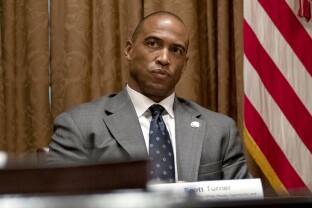With President Donald Trump preparing for major cuts to the Department of Housing and Urban Development, housing advocates from across the country gathered in Washington, D.C., this week to discuss how they can fight back.
Like other agencies facing cuts from the Trump administration, HUD is in the middle of a staff and funding overhaul, with nearly 50% of the agency’s staff at risk of losing their jobs.
So with the National Low Income Housing Coalition’s Housing Policy Forum scheduled for this week, a number of housing advocates said they were more motivated than ever to come to D.C.
“With all of the changes at the federal level, there is just this dearth of uncertainty and lack of information,” Avery Shivers, a community organizing fellow at Maryland Legal Aid, told NOTUS. “So events like this are really important because they help us see the bridges that have the potential to be built between places like Maryland and other states throughout the country.”
The three-day event, featuring the biggest names in housing advocacy, served as an opportunity for housing groups to compare notes, as they search for information from HUD. Entering only his second month as HUD secretary, Scott Turner has begun changing policies at the Office of Fair Housing and Equal Access, created a DOGE taskforce to assist in slashing funds and is reportedly planning on cutting up to 50% of the agency’s staff and more than 30 local field offices.
Sucely Murillo, a Rhode Island tenant advocate and member of NLIHC’s Collective program, said connecting with advocates from other states was the best way to make sense of the changes.
“I want to be able to take back the knowledge of how I can help reshape policies that offer equal and equitable help,” Murillo told NOTUS.
Following the last day of panels, registered attendees are expected to hold nearly 200 meetings with lawmakers on Capitol Hill to advocate for more affordable housing and argue against federal cuts to programs that would affect housing and homelessness.
Trenise Bryant, a housing organizer with Miami Homes for All, said advocates have been operating in the dark since the first Trump administration. While she will take home new organizing and operational strategies, the big questions remain unanswered.
“It really feels like everybody knows nothing,” Bryant told NOTUS. “And that is so frustrating because it feels like there are no real solutions.”
—
Amelia Benavides-Colón is a NOTUS reporter and an Allbritton Journalism Institute fellow.
Sign in
Log into your free account with your email. Don’t have one?
Check your email for a one-time code.
We sent a 4-digit code to . Enter the pin to confirm your account.
New code will be available in 1:00
Let’s try this again.
We encountered an error with the passcode sent to . Please reenter your email.


